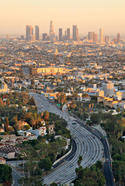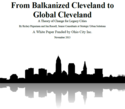America’s cities have been under fiscal pressure for an extended period of time. To cope with this, and better manage assets, they’ve increasingly turned to various forms of special purpose districts or entities for service delivery. Traditional independent service districts such as sewer districts or transit districts were often designed to circumvent bonding limits or to deliver services regionally, so were larger in scale. These newer service districts are much smaller in scope. They consist of two basic components: read more »
Policy
High Speed Rail Decision: Victory for Rule of Law
California Judge Michael Kenny has barred state bond funding for the California high speed rail system, finding that “the state's High-Speed Rail Authority failed to follow voter-approved requirements designed to prevent reckless spending on the $68 billion project.” These protections had been an important in securing voter approval of a $10 billion bond issue in 2008. Sacramento Bee columnist Dan Walters suggested that without the protections in Proposition 1A, the measure “probably would have failed” to obtain voter approval. read more »
- Login to post comments
Silicon Valley is No Model for America
Its image further enhanced by the recent IPO of Twitter, Silicon Valley now stands in many minds as the cutting edge of the American future. Some, on both right and left, believe that the Valley's geeks should reform the nation, and the government, in their image. read more »
The Revolt Against Urban Gentry
The imminent departure of New York’s Mayor Michael Bloomberg, and his replacement by leftist Bill DeBlasio, represents an urban uprising against the Bloombergian “luxury city” and the growing income inequality it represents. Bloomberg epitomized an approach that sought to cater to the rich—most prominently Wall Street—as a means to both finance development growth and collect enough shekels to pay for services needed by the poor. read more »
Los Angeles: Will The City Of The Future Make It There?
When I arrived in Los Angeles almost 40 years ago, there was a palpable sense that here, for better or worse, lay the future of America, and even the world. Los Angeles dominated so many areas — film, international trade, fashion, manufacturing, aerospace — that its ascendency seemed assured. Even in terms of the urban form, L.A.’s car-dominated, multipolar configuration was being imitated almost everywhere; it was becoming, as one writer noted, “the original in the Xerox” machine. read more »
From Balkanized Cleveland to Global Cleveland: A Theory of Change for Legacy Cities
Legacy cities have legacy costs, including disinvestment from the inner city, as well as regional economic decline. The spiral has been ongoing for decades. The new white paper by consultants Richey Piiparinen and Jim Russell entitled “From Balkanized Cleveland to Global Cleveland”, funded by the Cleveland-based neighborhood non-profit Ohio City Inc., examines the systemic reasons behind legacy city decline, all the while charting a path to possible solutions. read more »
Progressive Policies Burden the Yeoman Class
Obamacare's first set of victims was predictable: the self-employed and owners of small businesses. Since the bungled launch of the health insurance enrollment system, hundreds of thousands of self-insured people have either had their policies revoked or may find themselves in that situation in the coming months. read more »
Shareable Cities: Blurring the Lines
“We believed then as we do now, that the sharing economy can democratize access to goods, services, and capital – in fact all the essentials that make for vibrant markets, commons, and neighborhoods. It’s an epoch shaping opportunity for sustainable urban development that can complement the legacy economy. Resource sharing, peer production, and the free market can empower people to self-provision locally much of what they need to thrive. Yet we’ve learned that current U.S. policies often block resource sharing and peer production. – From the report “Policies for Shareable Cities”
“Digital information technology contributes to the world by making it easier to copy and modify information. Computers promise to make this easier for all of us. Not everyone wants it to be easier.” – Richard Stallman, “Why Software Should Not Have Owners”
Not long ago there were pretty clear boundaries between the personal sphere and the commercial one, as well as more clear boundaries between public and private space. read more »
Urban Containment and the Housing Bubble in Ireland
Economist Colm McCarthy says that urban containment policy played a major role in the formation of the housing bubble. In a commentary in the Sunday Independent, Ireland’s leading weekend newspaper, McCarthy relates how urban planning regulations led to higher house prices in the Dublin area (Note 1). read more »
- Login to post comments
Are Millennials Turning Their Backs on the American Dream?
In his classic 1893 essay, “The Significance of the Frontier in American History,” historian Frederick Jackson Turner spoke of “the expansive character of American life.” Even though the frontier was closing, Turner argued, the fundamental nature of Americans was still defined by their incessant probing for “a new field of opportunity.” Turner’s claim held true for at least a century—during that time, the American spirit generated relentless technological improvement, the gradual creation of a mass middle class, and the integration of ever more diverse immigrants into the national narrative. read more »




















